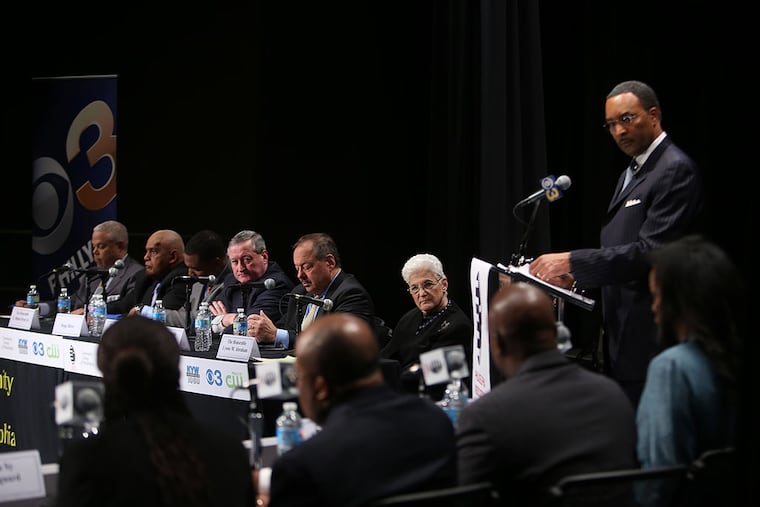Black issues take center stage at mayoral forum
Poverty, policing and education were themes at the Community College of Philadelphia.

Editor's note: This story has been corrected, regarding Williams' idea for a municipal bank.
THE WEEK'S fourth mayoral forum, hosted by the Philadelphia Association of Black Journalists, focused on issues that disproportionately impact black Philadelphians - poverty, policing and education.
Many of the candidates repeated now-familiar talking points, perhaps a sign of campaign fatigue from the numerous forums that have dominated this year's mayor's race.
The forum panel at the Community College of Philadelphia included Daily News columnist Jenice Armstrong, WURD radio host and Daily News columnist Solomon Jones, the Philadelphia Tribune's Irv Randolph and the Vanguard's Amanda Sy.
Former Councilman Jim Kenney again touched on a plan to support port expansion as a way to build high-paying, blue-collar jobs. State Sen. Anthony Hardy Williams twice repeated his idea for a municipal bank. Former judge Nelson Diaz touted his record of reforming public housing once more and his desire to abolish the SRC, while former mayoral spokesman Doug Oliver railed against the school district's "manufacturing model" for educating students.
With her campaign still trying to come back from her collapse to the floor at Tuesday night's first mayoral debate, former District Attorney Lynne Abraham attacked the politicization of the city's newly unveiled "land bank," designed to dispose of vacant properties and spur both private and affordable-housing development.
"The land bank won't work in its current manifestation," she said. "The problem is that . . . if somebody comes along and says, 'I want to build on that property,' they have to get the councilman or councilwoman whose district that property falls in to give his or her approval."
She also called for an end to councilmanic prerogative, an unspoken rule - and a touchy subject with legislators - that gives Council members final say on approving development projects in their district.
The mostly silent audience in the college's Bonnell Auditorium seemed largely unmoved, aside from occasional chuckling at outbursts from former state Sen. T. Milton Street. At one point, Williams, seated next to Street, joked that he had to wait for people to stop laughing so he could speak.
One of the night's tiffs came when Williams alluded to Kenney's failure to sign his pledge to adopt a series of federal recommendations for improving the Philadelphia Police Department. Kenney said he didn't sign because he doesn't believe in political pledges - but agreed along with Williams and Abraham that the recommendations should be adopted.
Several people interviewed as they left the auditorium said they still hadn't decided who they would vote for.
"I'm still trying to formulate my perspective [on the candidates]," Walter Bird said. "But I liked Street's disposition. There's something about him that captures your attention."